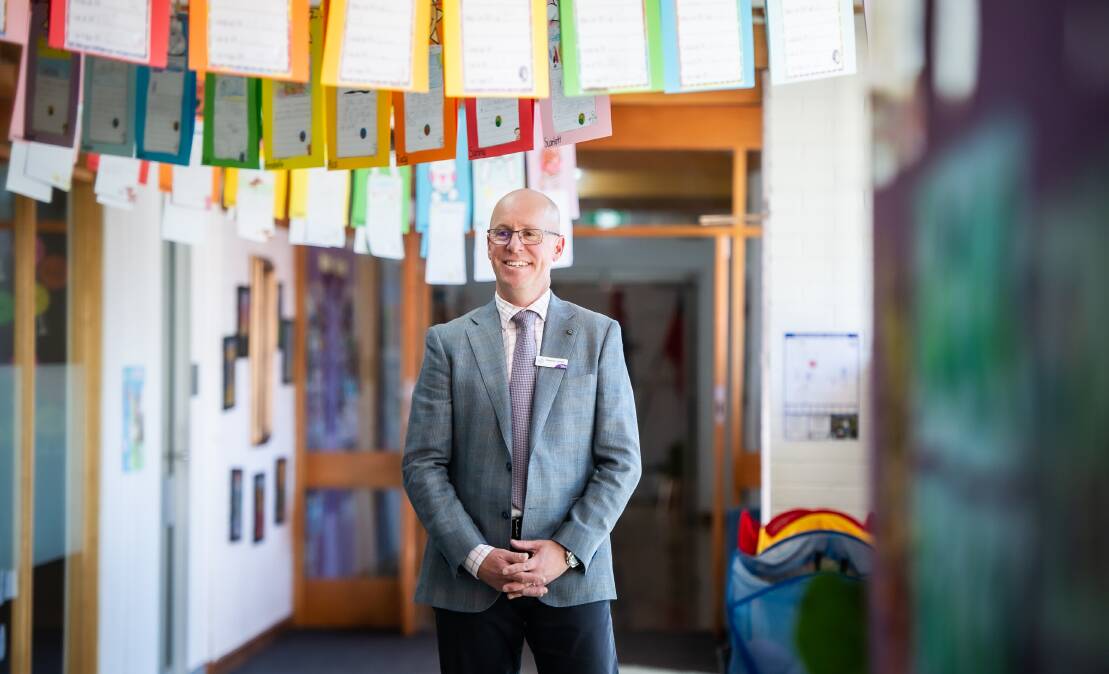
For the past decade England's schooling system has been on the rise in international measures, rising to fourth in the world in a recent literacy study.
Meanwhile, Australia has seen a plateau or even a decline in its literacy achievement despite ever increasing amounts of public money being poured into its schooling system.
St Joseph's Primary School O'Connor principal Cameron Tarrant was part of a Catholic education study tour of the United Kingdom in the recent school holidays to get a first-hand look at what the English are getting right in schools.
"There seems to be a greater awareness of the science of learning and understanding of cognitive load theory," Mr Tarrant said.
"England seems to have embedded it, it seems to have been in place longer and it doesn't seem to be the same debate that is happening here in Australia."
Reading instruction is still a topic that sparks controversy in Australia. In one camp there's balanced literacy. In the other corner, there's systematic synthetic phonics.
England's department of education steers schools towards the latter approach with major changes brought into the reading curriculum in 2010 to focus on phonics instruction.
A year 1 phonics screening check was introduced in 2012 to help schools identify students who needed extra help with reading.
Since then, the country's results in the Progress in International Reading Literacy Study (PIRLS) and Programme for International Student Assessment (PISA) have been steadily improving while most other English-speaking nations have declined.
Centre for Independent Studies education program director Glenn Fahey said Australia has seen some of the sharpest declines, only to be outdone by Finland.
"We've spent the better part of the last two decades idolising Finland," Mr Fahey said.
"That's resulted in us modelling practices and approaches ... from a declining education power, rather than modelling off the rising powers, which has been countries like England, even though they have a much more comparable system to analyse."
Australia has borrowed open-plan classrooms, inquiry-based learning and encouraging teachers to do masters degrees from Finland.
England started to go down a different route with the rise of the free school movement. These schools are funded by the government but are not run by the local authority.
The schools have more autonomy and don't have to follow the national curriculum. Some of these schools doubled down on the science of learning to become example schools.
Mr Tarrant visited two of these schools: Michaela Community School and Ark Soane Academy. He saw practices which mirrored what the Catholic Education Canberra Goulburn schools have been trying to achieve through the Catalyst program.
These include daily reviews of what was previously taught, direct instruction of new concepts and constant checking for students' comprehension.
The leader of Michaela Community School, Katharine Birbalsingh, has been dubbed "Britain's strictest headmistress" and is often speaking to the media about the traditional values and high expectations at her Wembley school.
"It's often a critique that schools like Michaela look like they are strict disciplinarians," Mr Fahey said.
"But what they do is they optimise the time that's available to learn and they optimise the time available for students to interact meaningfully by reducing the amounts of disruption and disorder that is so common, particularly in Australian schools."
The way teachers are trained and supported in the English system is more consistent than in Australia's fragmented, state-based system.
Teachers can be trained through schools and have access to coaches who work with them in the classroom.
"It's not ad hoc like it is in Australia. It's an early career framework that links learning the science of what effective teaching and learning looks like with effective practice. Those things are outlined very clearly in the core content of [initial teacher education] providers and in the early career framework," Mr Fahey said.
Mr Tarrant has already seen great improvements since switching to a prescriptive approach based on the science of learning three years ago.
For him, meeting leading education reformers in England confirmed what is working in their approach and why.
"We've been working through Catalyst initially for a couple of years now and we are looking as a system to where to next? What what does it look like in five or 10 years' time?" he said.
We've made it a whole lot easier for you to have your say. Our new comment platform requires only one log-in to access articles and to join the discussion on The Canberra Times website. Find out how to register so you can enjoy civil, friendly and engaging discussions. See our moderation policy here.







